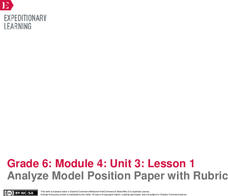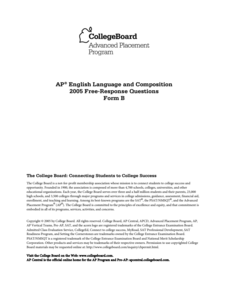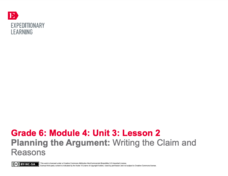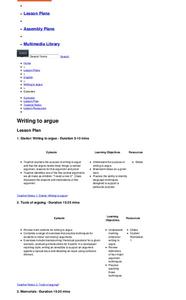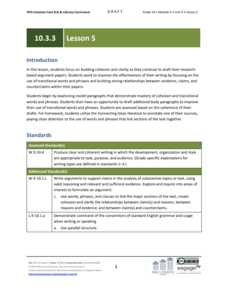Fluence Learning
Writing an Argument: Is Electronic Communication Helpful or Harmful?
Technology has undoubtedly improved the lives of people around the world—but has it improved communication? Seventh graders read two informative passages about the rise of texting and emailing versus in-person conversations before...
Curated OER
Thesis Statement + Projected Plan = Introduction
Set up your writers for writing strong introductions with a formula for putting together supported thesis statements. This reference page breaks the process down and provides an example of how to compose a thesis statement, develop a...
Anti-Defamation League
Harriet Tubman on the $20 Bill: The Power of Symbols
How important are symbols and symbolic gestures in society? Middle schoolers have an opportunity to analyze the importance of symbols on American currency with a lesson that investigates the controversies surrounding redesigning the $5,...
New York State Education Department
English Language Arts Examination: June 2014
Should companies track consumers' shopping preferences without their permission? Using the resource, scholars write source-based argumentative essays to answer the question. They also answer reading comprehension questions based on an...
Anti-Defamation League
Should Washington's NFL Team Change Their Name?
"What's in a name?" Is it irrelevant, as Juliet suggests in Shakespeare's play, or is nomenclature deeply significant? Young scholars weigh in on the debate by examining the controversy over the NFL's Washington, D.C. Redskins. Groups...
EngageNY
Analyze Model Position Paper with Rubric
It's time to choose a position! Scholars read a model position paper about fracking to practice identifying the topic and argument. Then, working with a partner, they use a rubric to assess the essay.
College Board
2005 AP® English Language and Composition Free-Response Questions Form B
Communication is the key. Prompts from the 2005 AP® English Language and Composition Free-Response Questions Form B allows scholars two opportunities to analyze the use of communication to express thoughts. First, pupils look at...
EngageNY
Mid-Unit Assessment: Completing My Draft Position Paper
What's the difference? Scholars analyze the similarities and differences between introductory and concluding paragraphs. Then, using a model essay as a guide, they write their draft position papers.
EngageNY
Planning the Argument: Writing the Claim and Reasons
Step up! Using the resource, scholars discover the six steps to writing an effective position paper. Next, they work on a graphic organizer to begin planning their argument-based essays.
Fluence Learning
Writing an Argument: Free Speech
How do you assess whether pupils have mastered certain concepts and skills? Designing a performance task that asks learners to demonstrate their skills and providing writers with a rubric that identifies these skills and provides...
EngageNY
End of Unit 2 Assessment, Part 1:Drafting the Argument Essay
An informative resource instructs pupils on how to write their essay drafts about the theme of control in Shakespeare's A Midsummer Night's Dream. Next, scholars complete an Exit Ticket, listing their three favorite characters from the...
EngageNY
Grade 10 ELA Module 3: Unit 3, Lesson 9
Let's join together and make a sentence. Scholars take the next step in revising their argumentative essays by combining independent clauses to make complex sentences. Writers use a Colon and Semicolon Handout to practice different ways...
EngageNY
Grade 10 ELA Module 3: Unit 3, Lesson 4
Always try to make an excellent first impression. As scholars begin to write their argumentative essays, they learn the importance of a good introduction. Writers also begin to add in-text citations to their papers. After reading a model...
K20 LEARN
Introduction to Arguing Effectively: Argument Writing
Which is better—Chick-fil-A or MacDonalds? High schoolers learn how to craft an argument essay by beginning an opinion statement. They state a claim, back up their claim with evidence, and consider counter calms. Scholars then create a...
Alabama Learning Exchange
The Big Bang Theory: An Evidence-Based Argument
What evidence supports the big bang theory? Individuals analyze scholarly resources about the the theory and develop arguments backed by evidence. They brainstorm, share ideas, watch a video, and read articles to complete a graphic...
EngageNY
Grade 9 ELA Module 4, Unit 1, Lesson 29
Writers review the provided essay rubric, edit and rewrite if necessary, polish their work, and then submit their argument essay.
Newseum
Slanted Facts and Slippery Numbers
The Internet is known as the information superhighway, but sometimes it's hard to know when to hit the brakes on unreliable sources. Using a well-rounded lesson plan, pupils read and summarize articles about the gender pay gap and...
Curated OER
Writing to Argue
Students write an argument using a clear structure and argumentative techniques. In this persuasive writing lesson, students brainstorm, write, and peer edit an argumentative essay. Worksheets include the prompt, facts and quotes, and a...
Virginia Department of Education
Writing Counterarguments
This activity is better utilized as a peer-editing exercise and not as an activity on how to write counterarguments. Writers take their argumentative rough drafts, peer edit in groups of four, and review the author on common essay...
College Board
2018 AP® English Language and Composition Free-Response Questions
Discussions of eminent domain sometimes trigger strong emotions. A set of free-response questions from the 2019 AP® English Language and Composition exam tackles the concept with a series of persuasive pieces. Learners analyze all six...
College Board
2017 AP® English Language and Composition Free-Response Questions
In the age of the Internet, are libraries still important? A collection of sources, part of a set of sample free-response questions from the AP® English Language and Composition exam, discuss that question. A variety of sources,...
College Board
2006 AP® English Language and Composition Free-Response Questions Form B
Should voting be a right or a requirement? 2006 AP® English Language and Composition Free-Response Questions Form B includes a prompt in which scholars take a stand on compulsory voting and complete an essay expressing their...
EngageNY
Grade 10 ELA Module 3: Unit 3, Lesson 5
Can you please clarify? Scholars continue to work on their argumentative essays about selling human tissue by clarifying and adding cohesion. Writers begin by looking at model paragraphs and then begin improving their writing. They...
Louisiana Department of Education
Out of the Dust
The Grapes of Wrath may be the most famous novel set during the Dust Bowl, but what other stories cover the same time? The unit focuses on the Karen Hesse novel Out of the Dust. Learners keep a timeline of the Dust Bowl, maintain a...







